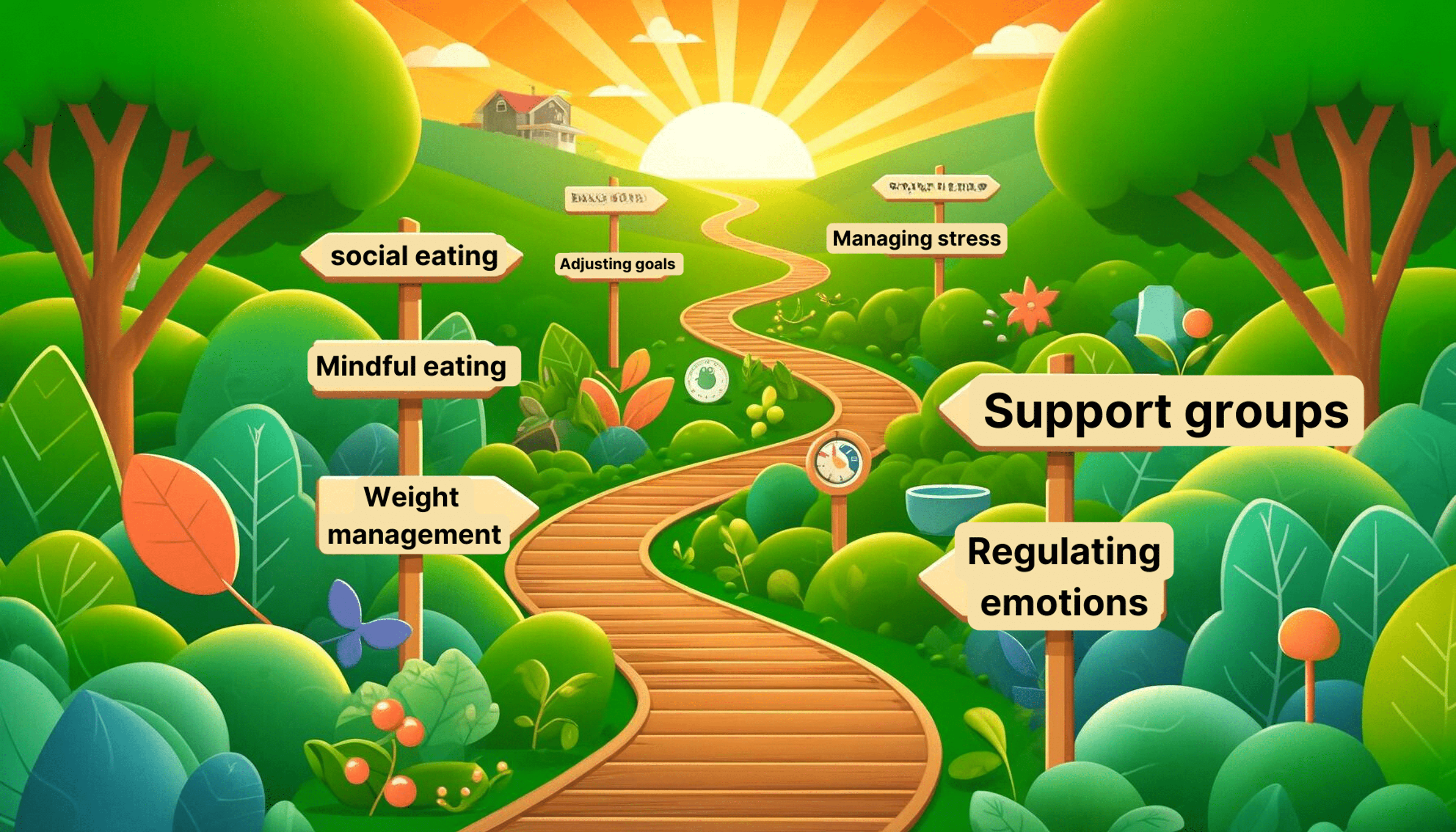Developing Life Skills to Keep the Weight Off

The Foundation of Sustainable Weight Management
Embarking on the journey towards sustainable weight management requires more than just a rigorous exercise routine or a restrictive diet. The path towards efficient, healthy, and long-term weight management is paved with other critical and often overlooked lifeskill enhancements, such as stress management, mindful eating, and self-discipline. These skills are a crucial part of a transformative shift towards a healthier lifestyle and are not to be underestimated.
Beyond Diet and Exercise: The Role of Life Skills in Weight Maintenance
A common misconception is that diet and exercise alone can lead to sustainable weight loss. However, without the cultivation of certain life skills, maintaining a healthy weight becomes a constant uphill battle. Developing these skills allows us to approach weight management holistically, enveloping all aspects of our daily lives.
It is these habits and skills that form the foundation for sustainable weight maintenance. For example, mental resilience and stress management are essential in helping us deal with weight-related challenges without resorting to unhealthy eating habits.
Furthermore, self-discipline plays a pivotal role in ensuring we stick to our weight management plans. Without an adequate level of discipline, it is easy to fall off the wagon, especially during social events or moments of emotional stress.
Mindful Eating and Listening to Your Body
Another crucial aspect of sustainable weight management is mindful eating. Contrary to popular belief, maintaining a healthy weight doesn't have to mean depriving ourselves of delicious food. Instead, it's about being aware of what we're eating, how much we're eating, and most importantly - understanding why we're eating.
Instead of eating out of boredom, stress, or emotional disturbance, mindful eating encourages us to eat only when our bodies truly require fuel. This practice involves identifying hunger cues, distinguishing them from emotional hunger, and responding to them appropriately. It's about slowing down and savoring our meals, rather than mindlessly eating in front of the television.
Managing Stress Without Turning to Food
Stress is a common trigger for unhealthy eating habits, often leading us to seek comfort in food. Techniques for stress management are essential tools in the journey towards sustainable weight management. These could involve practices like yoga, meditation, or other forms of physical activity. Even hobbies or spending time with loved ones can serve as effective stress management techniques.
Managing weight is not about temporary changes but about unveiling a healthier and more balanced version of ourselves. This journey involves encompassing all aspects of our lifestyles and learning to navigate the challenges that stand in our way. The key to sustainable weight management lies not just in w
hat's on our plate, but also in mastering the essential life skills that promote a healthier, happier, and more balanced life.
Critical Life Skills for Weight Maintenance
To achieve successful, sustainable weight maintenance, it is not enough to follow a strict diet or workout regimen. Lifestyle, habits, and daily behaviors play a crucial role. Here we delve into specific life skills that are often overlooked yet essential for keeping the weight off in the long run. These skills encompass goal setting, nutritional education, emotional regulation, and the ability to navigate social situations and food cues.
Setting and Adjusting Goals Strategically
The journey to permanent weight maintenance begins with goal setting. Setting realistic, achievable short-term and long-term goals gives direction and motivation to your weight management journey.
Initially, goals may be centered on weight loss figures, but as you progress, they should focus more on the adoption of healthy habits and behaviors.
Remember, it is equally important to adjust your goals as you move forward. Be flexible and be ready to make modifications based on the changes and fluctuations in your lifestyle, body, and preferences. For instance, if you've reached a plateau, try introducing a new physical activity or changing your dietary intake.
Educating Yourself on Nutrition and Food Choices
Nutritional education plays a pivotal role in weight maintenance. Understanding what, when, and how much to eat enables you to make healthier food choices consistently.
Start by learning the nutritional content of different foods and their effect on your body. Don't just focus on calories; take into account the macronutrient content (carbohydrates, proteins, and fats), micronutrient density (vitamins, minerals), as well as the fiber content of the foods you consume.
Develop an awareness of portion sizes. Often, we tend to underestimate the amount of food we eat, leading to unintentional overeating. By understanding portion sizes, you can balance your meals better and avoid overconsumption.
Regulating Emotions and Coping with Stress Healthily
People often tend to 'emotionally eat', i.e., consume food in response to stress, anger, or sadness. This emotional regulation can lead to overeating and weight gain.
Develop healthy mechanisms to manage stress, such as engaging in physical activities, deep breathing exercises, meditation, or hobbies. Make sure to get adequate sleep, as lack of sleep can contribute to stress and hinder weight maintenance efforts.
It's okay to seek professional help when needed. A therapist or a support group can provide you with strategies to deal with emotional eating and keep you accountable on your journey.
Navigating Social Eating and External Food Cues
Food plays a significant role in social gatherings, and learning to navigate these situations is another essential life skill. You can maintain your dietary balance while still enjoying social events. Choose smaller portions, leaner cuts, and avoid high-sugar, high-fat foods.
Be mindful of external food cues like food advertisements, buffet spreads, etc., that encourage overeating. It can be helpful to establish some rules for yourself beforehand, like using smaller plates, serving yourself, filling your plate with vegetables first, to keep your eating habits in check.
Being conscious of these factors and making an effort to develop these life skills can greatly enhance your ability to maintain a healthy weight in the long term.
Incorporating and Cultivating Life Skills Daily
In the journey towards sustained healthy weight management, focusing on your physical conditions solely is not enough. Understanding and incorporating relevant life skills into your habitual practices is essential to maintain a healthy lifestyle in the long run. Ultimately, empowering and nurturing these skills can lead to creating a sense of ownership and self-motivation that is pivotal for achieving and maintaining your weight management goals.
Practical Tips for Building and Strengthening New Habits
The first stage in this process involves adopting new habits. It is common knowledge that habits are routines of behavior that are performed regularly and tend to occur subconsciously. In health and fitness, creating sustainable habits is a fundamental part of maintaining progress and avoiding weight regain.
-
Identify the habit you want to create: Be specific about what you want to achieve, whether it's exercising for 30 minutes a day, eating a balanced breakfast, or drinking eight glasses of water.
-
Start Small: It's easier to start a habit that's so easy you can't say no.
-
Commit For The Long-Haul: Real change comes from the compound effect of hundreds of small decisions – doing two push-ups a day, waking up five minutes early, or holding a single short phone call.
-
Reward Yourself: Positive reinforcement aids in cultivating new habits. Consider rewarding yourself with something you enjoy after completing your goal.
Remember, the formation of new habits takes time. However, perseverance and consistency can result in positive long-term changes.
Finding and Utilizing Support Systems
An important element in the journey is finding and utilizing support systems. Whether it's friends and family, a personal trainer, or a wellness coach, having someone in your corner can offer various benefits like motivation, emotional support, and accountability.
-
Identify Your Support: Is it your family, friends, a mentor, or fitness group? Understand who can help you in this journey.
-
Ask For Help: Don't be shy to ask for support and communicate what you need from them, whether it's emotional support or being your workout partner.
-
Regularly Interact with Your Support System: Frequent communication can increase motivation and keep your goals on track.
The power of human connection and encouragement from a support system should never be underestimated in the weight management journey.
The Importance of Lifelong Learning and Adaptability
Finally, embracing lifelong learning and adaptability is at the core of maintaining a healthy weight in the long run. This entails continuous self-education on nutrition and exercise, as well as adapting to new information and techniques.
-
Stay Informed: Regularly update your knowledge about nutrition, fitness trends, and healthy lifestyle tips.
-
Adapt To Changes: Be flexible. If a plan isn't working, learn to adjust it. Altering your fitness plan or Nutrition strategy as per your body's response is completely normal.
-
Learn from Mistakes: Treat all setbacks as learning opportunities. Failure is not falling down, but refusing to get back up.
Understanding your health journey as a dynamic, evolving process promotes a sustainable, long-term approach to weight management and overall wellness. Remember, it's about making lifelong sustainable changes rather than seeking quick fixes or short-term solutions.
In Summary
All things considered, sustainable weight management is more than just diet and exercise. It involves developing and nurturing life skills such as stress management, goal setting, emotional regulation, and mindful eating. In particular, mentality and perspective play a significant role in long-term weight maintenance. Proper nutritional education and strategies for coping with social situations and external food cues are also crucial. Last but not least, cultivating new healthy habits, leveraging support systems, and embracing continuous learning and adaptability lay the groundwork for sustained weight management.
Action Steps:
- Identify one lifestyle skill from the post that you feel is lacking in your life and seek resources to develop it.
- Practice mindful eating in your next meal, free yourself from distractions and pay attention to your hunger and fullness cues.
- Next time you are stressed, instead of reaching out for a piece of candy or soda, try one of the stress-management activities recommended in this post.
- Set your weight management goals and have a plan for reaching them.
- Start learning about the nutritional value of the food you commonly eat.
- Recognize your emotional eating triggers and look for healthier ways to manage these situations.
- Identify and engage your support systems. Discuss your weight management goals with them and express how they can support you.
- Meanwhile constantly stay open to learning more about exercise, nutrition, and wellness.
- Celebrate your victories, however small they may seem! Each time you successfully implement a new healthy habit or resist an unhealthy temptation, you're inching closer to your goal.




